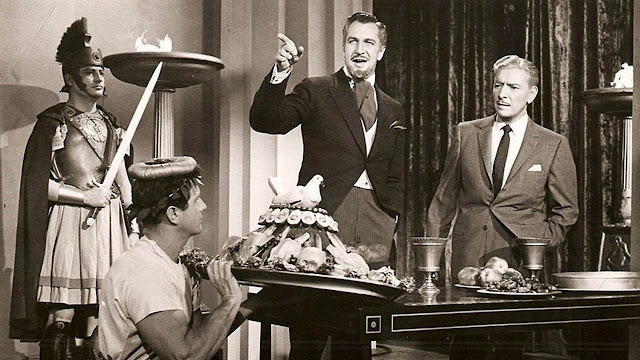Synopsis - The Devil and the spirit of Mankind argue whether or not humanity is good or evil.
Cast - Ronald Colman, Hedy Lamarr, Groucho Marx, Harpo Marx, Chico Marx.
Crew - Irwin Allen (Director/Writer), Charles Bennett (Writer)
Runtime - 100 minutes
"My colleague paints the prettiest pictures, not accurate but pretty"
It is peculiar to me that Warner Bros. made this movie in the 1950s. While the studio's main attractions were Noirs (A Lion in the Streets, Dial M for Murder) or Science Fiction (Them!, The Beast of 20,000 Fathoms), Jack Warner approved the making of something boring, insensitive, and quite strange.
This is a "Cosmic Tribunal" type movie, perhaps less of a foreign concept today but, at least to me, this is the earliest I've seen it depicted in a film. While this movie ran its course I could not stop thinking about how the sets, while minimal and obviously fantastic felt cheap, information about this film is limited so I could not find any information about it, but by the use of recognizable stars I can be sure it wasn't made in a small budget. Their overutilization of stock footage and parts from better movies than this one (Helen of Troy, Land of the Pharaohs) did not help alleviate this feeling.
This movie is stupid, its message has a very conservative tone, one that prevents any self-reflection, it only makes the audience of the 1950s think that they, could never be as stupid or ignorant as the people from the past when in fact, the KKK started to be even more present in public life, the civil rights movement was starting to reach its zenith, and the efforts of millions of marginalized people were heard all over the world. For the audience in the 21st century, it only remarks the deep ignorance people had and their efforts to never look beyond what is presented to them, painting nice images of what the past was and ignoring the pain and suffering made by their "heroes" to hundreds, thousands and millions of people around the world.
Even worse than the sets and production of the movie is the story. This is a fable, trying to prove that humanity has a lot of virtues that make us unique and with the power to create beautiful things thus deserving of a space in the universe. Because this was made in the 1950s, the film lacks the intelligence and critical skills to make it work, are we, the audience of 2024, supposed to side with the Devil? Because he is the only one presenting things as how they are, the issues within a broken society, the genocide, the wars, and the lack of empathy everyone shows, while The Spirit of Humanity presents "important" figures and their contributions to society, most of the people he presents are not good people and should not be held on a pedestal for all eternity. Am I supposed to think that the genocide of indigenous populations in The Americas can be whitewashed by the "friendly" pact between the English and Spanish empires a century after the introduction of the New World to the Old?
There are movies and TV shows presenting this topic in better ways, usually in the realm of comedy, for TV I can only recommend Regular Show while is a bit out there it at least makes it an entertaining watch and it only focuses on two characters for each episode. For movies, Mexico 2000 is a low-budget Mexican movie that offers a satire of the Mexican Government, its institutions, and society. It has many instances of racism and sexism but the message is one that I, as a Mexican man, could relate to and laugh at.


Comments
Post a Comment